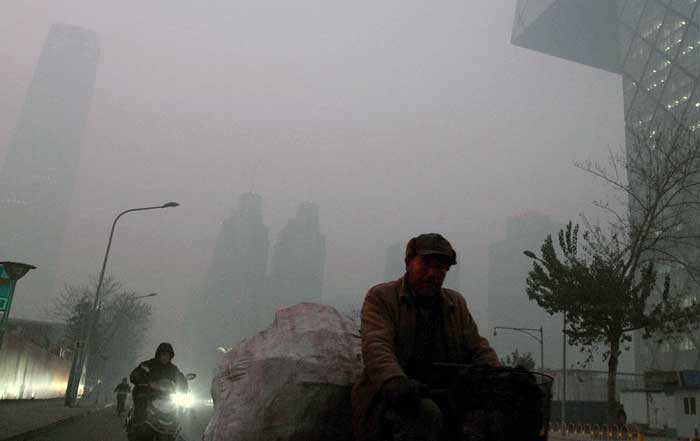According to the American Lung Association's 2024 "State of the Air" report, 131 million people in the U.S. are exposed to unhealthy levels of air pollution, with 43.9 million living in areas with failing grades for all three measures of air pollution. The report also highlights the disproportionate impact on people of color, who are 2.3 times more likely to live in such areas. Climate change is reversing gains in air quality, with a study projecting a 10% surge in particulate matter (PM2.5) levels over the next three decades, potentially erasing progress made in the past 20 years. Air pollution is a pressing issue that affects every corner of the globe. It is a significant contributor to climate change, causing harm to both human health and the environment so we will be investigating the causes, effects, and solutions to air pollution.
The Scope of Air Pollution
Air pollution is a complex issue with far-reaching consequences. It is a major contributor to climate change, accounting for approximately 12% of global greenhouse gas emissions. The World Health Organization (WHO) estimates that 9 out of 10 people worldwide breathe air that exceeds WHO guideline limits for air quality. This pollution is not limited to urban areas; it affects rural and remote regions as well.
Causes of Air Pollution
Air pollution is primarily caused by human activities, such as:
Industrial Activities
Industrial processes, including the burning of fossil fuels, release pollutants into the air. This includes emissions from power plants, factories, and other industrial facilities.
Transportation
The transportation sector is a significant contributor to air pollution. Vehicles, including cars, trucks, and airplanes, emit pollutants such as nitrogen oxides, particulate matter, and carbon monoxide.
Agriculture
Agricultural practices, including the burning of agricultural waste and the use of pesticides and fertilizers, contribute to air pollution.
Domestic Activities
Household activities, such as cooking and heating with fossil fuels, also release pollutants into the air.
Natural Sources
Natural sources, such as wildfires, volcanic eruptions, and dust storms, can also contribute to air pollution.
Effects of Air Pollution
Air pollution has severe and far-reaching effects on both human health and the environment:
Human Health
Air pollution is linked to a range of health problems, including:
- Respiratory Issues: Air pollution can exacerbate respiratory conditions such as asthma, bronchitis, and chronic obstructive pulmonary disease (COPD).
- Cardiovascular Disease: Exposure to air pollution has been linked to an increased risk of cardiovascular disease, including heart attacks and strokes.
- Cancer: Long-term exposure to air pollutants, particularly particulate matter, has been linked to an increased risk of lung cancer.
- Neurological Disorders: Air pollution has been associated with an increased risk of neurological disorders, including dementia and Parkinson's disease.
Environmental Impact
Air pollution has significant environmental impacts, including:
- Climate Change: Air pollution contributes to climate change by releasing greenhouse gases into the atmosphere.
- Ecosystem Disruption: Air pollution can disrupt ecosystems by altering the composition of the atmosphere, affecting plant growth and animal behavior.
- Soil and Water Contamination: Air pollution can lead to soil and water contamination, harming agricultural productivity and human health.
Solutions to Air Pollution
Addressing air pollution requires a multifaceted approach, involving both individual and collective actions:
Individual Actions
Individuals can take several steps to reduce their contribution to air pollution:
- Use Public Transportation: Using public transportation instead of personal vehicles can significantly reduce air pollution.
- Carpooling: Carpooling with friends and colleagues can reduce the number of vehicles on the road.
- Walk or Bike: Walking or biking for short distances can reduce air pollution.
- Use Energy-Efficient Appliances: Using energy-efficient appliances can reduce energy consumption and associated air pollution.
- Reduce, Reuse, Recycle: Practicing the 3Rs can reduce waste and the need for incineration, which is a significant source of air pollution.
Collective Actions
Collective actions can have a more significant impact on reducing air pollution:
- Government Regulations: Governments can implement regulations to reduce emissions from industrial activities, transportation, and domestic sources.
- Incentives for Sustainable Practices: Governments can offer incentives for sustainable practices, such as tax breaks for companies that adopt clean energy technologies.
- Investment in Clean Energy: Governments can invest in clean energy technologies, such as solar and wind power, to reduce reliance on fossil fuels.
- Public Awareness Campaigns: Public awareness campaigns can educate people about the dangers of air pollution and encourage them to adopt sustainable practices.
Air Pollution in 2024
Million people in the U.S. exposed to unhealthy air pollution levels
Causes of Air Pollution
- Industrial Activities
- Transportation
- Agriculture
- Domestic Activities
- Natural Sources
Effects of Air Pollution
Solutions
Global Efforts to Combat Air Pollution
Several global efforts are underway to combat air pollution:
United Nations Framework Convention on Climate Change (UNFCCC)
The UNFCCC aims to reduce greenhouse gas emissions and mitigate climate change, which includes addressing air pollution.
World Health Organization (WHO)
The WHO has established guidelines for air quality and is working to improve air quality worldwide.
International Council on Clean Transportation (ICCT)
The ICCT is a non-profit organization that works to reduce air pollution from transportation sources.
Global Alliance on Health and Pollution (GAHP)
The GAHP is a coalition of organizations working to reduce air pollution and its impacts on human health.
Air pollution is a global crisis that requires immediate attention and only by understanding the causes, effects, and solutions, can individuals and governments take collective action to reduce air pollution and mitigate its impacts on human health and the environment. Sustainable practices, government regulations, and global efforts are crucial.

